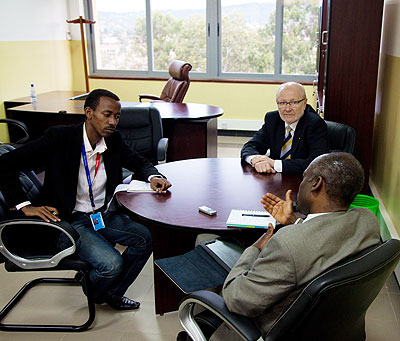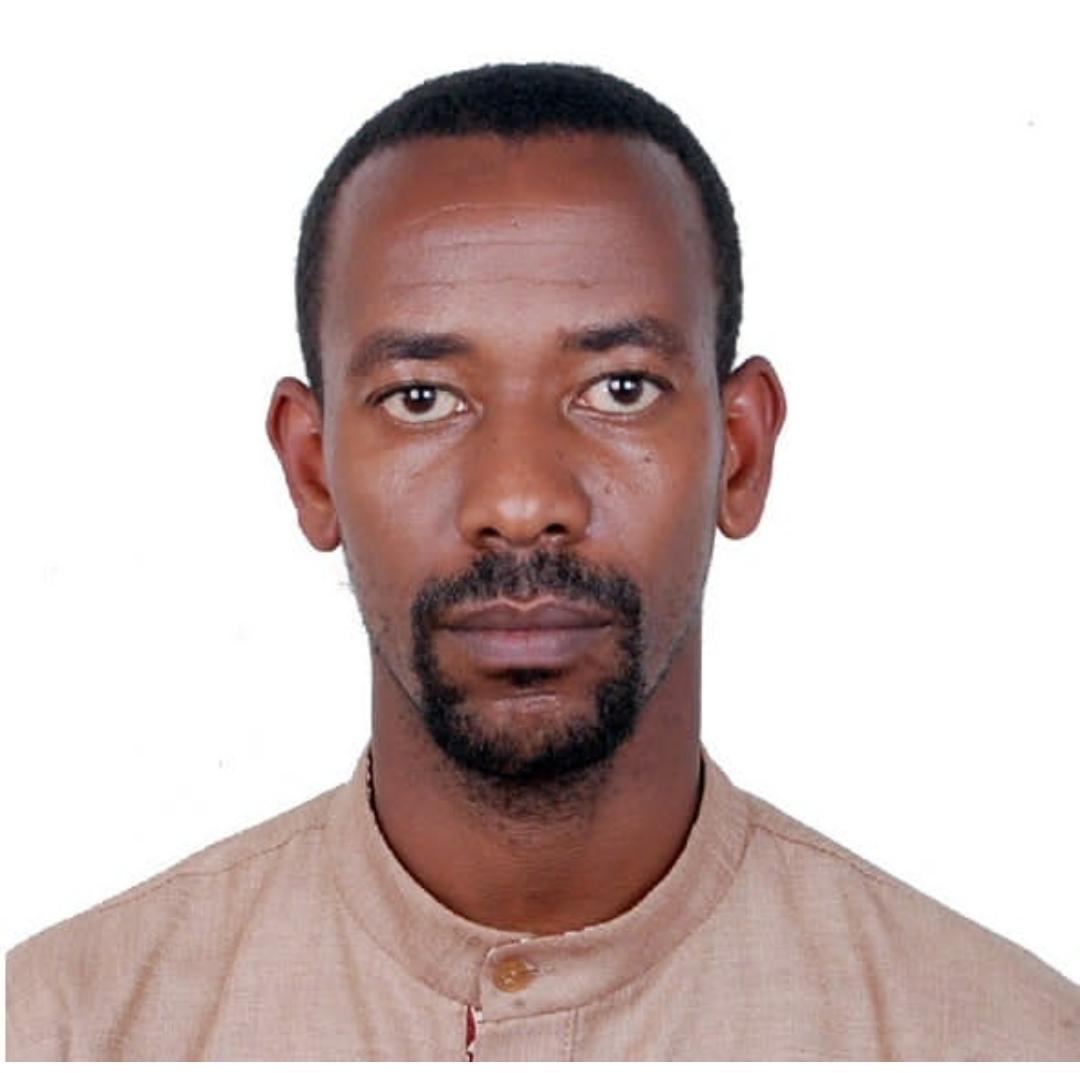As part streamlining the country’s tertiary education sector and align it to international standards, government merged seven public universities into one, ‘University of Rwanda’. Last month, globally recognised academics were appointed by the cabinet to lead the University. Among those include Prof James McWha the vice-chancellor and Prof Nelson Ijumba, the Deputy Vice Chancellor (Academics). The New Times’ Edwin Musoni, had an exclusive interview with the duo about how they plan to handle the task ahead of them and below are the excerpts.


As part streamlining the country’s tertiary education sector and align it to international standards, government merged seven public universities into one, ‘University of Rwanda’. Last month, globally recognised academics were appointed by the cabinet to lead the University. Among those include Prof James McWha the vice-chancellor and Prof Nelson Ijumba, the Deputy Vice Chancellor (Academics). The New Times’ Edwin Musoni, had an exclusive interview with the duo about how they plan to handle the task ahead of them and below are the excerpts.
Now that you have established yourselves in Rwanda, what are the immediate tasks that you intend to take on as a matter of priority?McWha: We intend to focus on ensuring that our students get quality education. This means that our graduates will acquire both information and skills that can enable them compete favourably in the job market. Our immediate challenge, therefore, is to lift the whole tertiary education sector to a level that allows us to compete internationally and our mission is to ensure that the students we produce are as good if not, better than the students elsewhere in the world.How do you intend to achieve this ?McWha: We plan to engage our students in research, which is about finding new knowledge and we want them to be taught by people who are actively involved in research and knowledge generation. We want to build a research-based institution.The academia in Rwanda has been accused of doing little to publish. How do you intend to solve this problem?Ijumba: You are right, the research base is very low, which means the production of research output is also quite low as well. We are going to build a research base by encouraging staff to carry out research, but at the same time, we are looking at possible areas where we can increase our research productivity.So, apart from broadening the base, we intend to build capacity.One of the things in that line is for us to ensure that the majority of the staff get their PhDs. We need partnerships to achieve this. We may have to send staff for further studies abroad and improve the supervision capacity for those who already have PhDs. Also, once you have staff with PhDs, you definately attract foreign students. Our objective is to ensure that the staff who do not have PhDs get them. There are some initiatives underway with the former universities. We are going to build on those ones and even initiate many more.Rwanda has a big number of graduates who are unemployed. What are the strategies you intend to adopt to ensure University of Rwanda produces employable graduates?McWha: One of the strategies is to draw a five to ten-year strategic plan, and to do this, we will engage big businesses and employers to tell us what they need and what they expect from us. Our starting point will be determining what they want and we inculcate that into our planning process so that the graduates we produce match the demand in the market. We shall also invest more in research and once these research programmes materialise, new industries will emerge with new entrepreneurs. These will require qualified graduates.It will, therefore, become a cycle and in the long run, we would be building the economy. It is what brought us here. We want Rwanda to benefit from our expertise.There is no point having a university if the community where it is situated does not benefit from it. We, therefore, aim at ensuring that Rwanda benefits from this new university.As the cycle builds up, there will be more demand for graduates and the university will grow. As industries keep growing, employers will be looking for more sophisticated graduates and that is what we will be producing for them.For example, there are a lot of medical challenges that Rwanda is facing and we want to empower the medical sector through producing highly qualified graduates.Ijumba: One of the main objectives of the University is to contribute to the socio-economic transformation of the country. This can be achieved through research, innovation and entrepreneurship. Entrepreneurship means creating jobs.With the University of Rwanda colleges scattered across the country, won’t this promote bureaucracyMcWha: The challenge is that we have seven different bureaucracies, we intend to simplify this in the near future. The advantage of having one integrated entity is that all the disciplines will be contained within one institution. The academicians and researchers will be able to easily communicate to each other and this will benefit the university. Having facilities across the country make it easier for our students to access university programmes . If we can make use of new digital technologies to deliver programmes, then we won’t have any case of bureaucracy.One of the biggest challenges the education system is facing is low quality.which cannot be addressed from the university level, how are you intend to go about that?McWha: The quality of graduates we produce has a close relationship with the kind of education students acquired at the elementary levels. The graduates we produce are the ones that teach in primary and secondary schools, meaning that if we improve university education, then we will be able to improve the entire education sector.We also intend to interact with schools and share with them the kind of students we want them to send to universities. Basically we want every school in the country to be able to produce students of uniform quality.Ijumba: It is also important to look at academic support programmes to help students to fully prepare for university education. We accept that students joining university may not suit the standards, so we have to address that challenge.Will the merger improve the position of the institution in global rankings?Ijumba: We are aspiring to be a research-based university which will automatically grant us a high positions in world rankings. One of the components considered in the rankings is having foreign staff and foreign students. The basis for this is that they enrich academic programmes. We are expecting foreign students and foreign staff.McWha: The education system that qualifies for rankings has been existent, but it had some weakness. I have to say the President has shown tremendous ways of creating something special in Rwanda.When you are looking at world rankings, size matters, this is why we are sure of an improvement. Most good public universities range betweeen 30,000 to 60,000 students and we fit within this bracket.Are you intending to generate funds besides relying on government and how do you intend to do this?McWha: Funding will be one of our biggest challenge but hopefully, much of it will be foreign. We are looking at big businesses and contributions from wealthy Rwandans. We also expect assistance from international corporations. If we can provide valuable information to them through research, then they will fund us.Ijumba: if you identify viable and relevant projects that attract partners then you get funding. There are many projects in that line, like agriculture and food security, energy and biodiversity and many others. We can venture into these and compile research and get money.
------------------------------------------------
University of Rwanda Fact File- Most of the appointments in the senior management of the university are seasoned scholars who have extensively contributed to the improvement of higher learning institutions where they previously worked.- A good number of them are also well known elite Rwandans or dedicated friends of Rwanda and advisors to President Paul Kagame who have recently contributed to the development of the education sector in Rwanda.- Also appointed were principals of six Colleges that are affiliated to the university which will incorporate specific similar study programmes.- They include Dr Papias Musafiri Malimba for the College of Business and Economics and Prof. George Njoroge for the College of Education. - Dr Laetitia Nyinawamwiza, who has been the vice rector in charge of academic affairs at the Institute of Agriculture and Animal Husbandry, was named Principal for the College of Agriculture, Animal Sciences and Veterinary Medicine. - Dr Phillip Cotton for the College of Medicine and Health Sciences, Usta Kaitesi for the College of Arts and Humanities, while Dr Manasseh Mbonye was named principal for the College of Science and Technology. - The Board of Governors is chaired by Prof. Paul Davenport, a member of the Presidential Advisory Council (PAC) which is made up of high profile advisors to President Kagame. - By merging resources that were scattered at different institutions, it is hoped that the university will improve the quality of education and effectively respond to current national and global needs, Rwandan education officials have said.- The new University of Rwanda will tentatively have its headquarters at newly built structures at the campus of former SFB in Kigali.- Prof. James McWha who was named vice-chancellor and Prof. Nelson Ijumba is the university’s deputy vice-chancellor for academic and research affairs. Prof. McWha was until last year the vice-chancellor and president of the University of Adelaide, Australia, while Ijumba has been deputy vice-chancellor for research at the University of KwaZulu-Natal, South Africa.Pudence RubingisaThey were both described by Minister Biruta as competent people who were chosen by the Rwandan leadership through a competitive process whereby an international call for qualified applicants was made and they emerged successful.***Dr Phillip CottonProf. Cotton is a family doctor by training. He has been Professor of Learning and Teaching in the School of Medicine at Glasgow University where he was deputy head of the undergraduate school. He served on Scottish Council of the Royal College of General Practitioners (RCGP) as international lead and on UK Council of RCGP, as well as being a member of the International Committee. His Masters in education focussed on transformative education.His doctoral thesis is on accountability in health care, and his Masters in education focussed on transformative education. He is co-editor of ‘Practical General Practice’ which is an evidence based approach to medicine, and is co-author of handbook of empathy-based communication skills.


